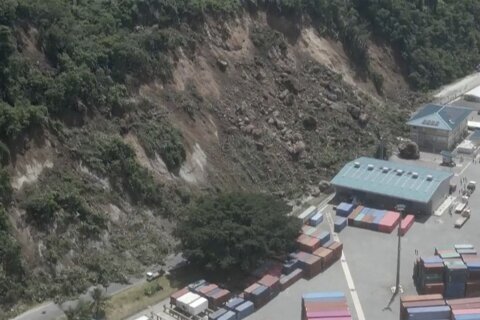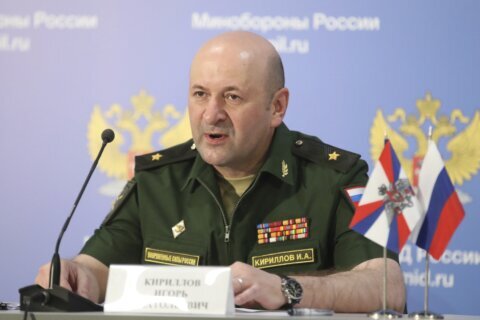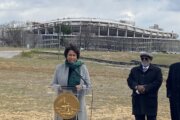SEOUL, South Korea (AP) — South Korea’s acting leader vowed Tuesday to convey to the world that things are back to normal following parliament’s impeachment of conservative President Yoon Suk Yeol, as rival parties squabble over the appointments of justices who will determine whether to unseat or reinstate him.
The country’s liberal opposition-controlled parliament voted to impeach Yoon last Saturday over his short-lived Dec. 3 martial law imposition, suspending Yoon’s presidential powers until the Constitutional Court determines whether he can continue in office. If Yoon is dismissed, a national election must be held within two months.
Prime Minister Han Duck-soo, who became acting leader, has taken steps to reassure the U.S. and others and stabilize markets. Presiding over a Cabinet Council meeting on Tuesday, Han said he will “continuously do my utmost to inform the international society that the Republic of Korea is fast regaining stability and maintaining confidence with partners.”
But the country’s intense political strife appears to be far from over, as the rival parties began bickering over whether to fill three vacant seats at the Constitutional Court.
How many justices are needed to unseat Yoon?
To formally end Yoon’s presidency, the nine-member court panel needs support from at least six justices. But since three seats remain vacant following retirements, a unanimous decision in favor of Yoon’s impeachment is required to throw him out of office.
Three of the court’s nine justices are directly appointed by the president. Three others are nominated by the Supreme Court head and another three by the National Assembly, and their appointments by the president have largely been a formality. The three seats that are currently open are to be nominated by the National Assembly — two by the Democratic Party and the other by Yoon’s ruling People Power Party.
The court can rule on Yoon’s case with only the current six justices. But the main liberal opposition Democratic Party, which led the impeachment efforts against Yoon, has said it will speed up the process of restoring the court’s all nine justices to promote fairness and public confidence in its ruling.
PPP floor leader Kweon Seong-dong, a Yoon loyalist, created a stir Tuesday as he voiced his objection to the push to fill the three vacancies. He said it would be inappropriate for Han, the acting leader, to appoint justices nominated by parliament, saying such authority solely rests with the president.
“An acting president can appoint Constitutional Court justices when there is a presidential vacancy, but not when the president’s duties are just suspended,” Kweon said.
Many observers say the court’s current six-member configuration is advantageous for Yoon’s chances to return to office, as it would only require a single justice rejecting the parliament’s impeachment. They note that Cheong Hyungsik, one of the six justices, is a clear conservative who was directly appointed by Yoon.
Battle over appointments exposes deep divisions
The Democratic Party quickly dismissed Kweon’s argument as “absurd and utterly nonsensical” and urged PPP to abide by a November agreement between the parties to nominate the three Constitutional Court justices.
Party lawmaker and spokesperson Jo Seoung-lae said PPP has “blatantly revealed their true intention to obstruct the constitutional trial.”
There was no immediate response from Han, who during the Cabinet meeting stressed that the government will cooperate with the ruling and opposition parties to stabilize the economy.
There is no clear definition about what an acting president can and cannot do over the appointments of the court’s justices.
Some experts say it’s clear that Han has the authority to appoint the justices, as there’s no legal provision preventing him from doing so and he would be appointing justices picked by legislators. South Korea’s constitution states that the National Assembly “selects” three spots on the court’s bench rather than recommends, suggesting that the presidential appointments for these spots are a formality rather than substantive authority, they say.
Kim Jung-won, the Constitutional Court’s secretary general, told the parliament on Tuesday that the court believes the acting president can exercise the right to appoint justices.
The Democratic party accuses PPP of trying to drag out the impeachment trial at the Constitutional Court, which has up to 180 days to determine Yoon’s fate.
Time is a crucial issue for Democratic Party leader Lee Jae-myung, who is favored by polls to win a presidential election in the event of Yoon’s ouster but grapples with his own legal troubles. Lee could possibly be prohibited from running for president if the appellate and Supreme courts upheld his lower court conviction for election law violation in November.
Yoon faces allegations of rebellion and abuse of power over his martial law introduction. Investigative authorities want him to appear for questioning later this week, but officials at Yoon’s office and residence on Monday refused to receive requests for his appearance.
The martial law declaration, the first of its kind in more than 40 years, drew hundreds of troops who tried to encircle parliament and prevent lawmakers from voting on the decree. Many lawmakers still managed to get inside a National Assembly chamber and voted to overturn Yoon’s decree unanimously, forcing Yoon’s Cabinet to lift it.
Yoon’s decree, which harkened back to an era of past military-backed dictatorships, has sparked massive street protests calling for his ouster and resulted in his approval rating plummeting. Yoon’s defense minister, police chief and several other senior military commanders have been arrested over their roles in the martial law enforcement.
Supporters of Yoon worry that his early exit would severely hamper the country’s conservatives and cause them to likely lose a presidential by-election to the liberals, like they did in 2017, when then-impeached conservative President Park Geun-hye was ousted and arrested over a corruption scandal.
Copyright © 2024 The Associated Press. All rights reserved. This material may not be published, broadcast, written or redistributed.






